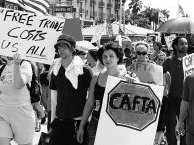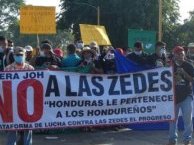
The US-Dominican Republic–Central America Free Trade Agreement (CAFTA-DR or CAFTA for short) was signed in 2004. It encompasses the United States and the Central American countries of Costa Rica, El Salvador, Guatemala, Honduras, Nicaragua and the Dominican Republic.
The investor-state dispute settlement (ISDS) mechanism specified in CAFTA has provided US companies privileged means to challenge national laws and claim millions of US dollars in compensation in Central America.
As of end of 2019, CAFTA was invoked in 11 cases.
The most well-known cases include:
• TCW (US) vs. The Dominican Republic: case settled in 2009 for US$26.5 million to the investor, an investment management corporation.
• Railroad Development Corporation (US) vs. Guatemala: US$18.6 million awarded in 2012 to the investor in a dispute over a railroad contract.
• Pac Rim Cayman LLC (US) vs. El Salvador: In 2008, El Salvador denied a mining permit to Pac Rim (now OceanaGold) due to environmental concerns, and notably the impact on water resources. In 2012, the arbitral tribunal dismissed jurisdiction over the CAFTA claims but assumed jurisdiction of the claims under the domestic investment law. In October 2016, the tribunal decided that the company’s case was without merit.
Photo: Danny Hammontree / CC BY-NC-ND 2.0
(March 2020)





